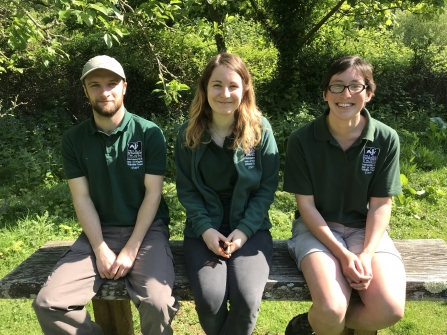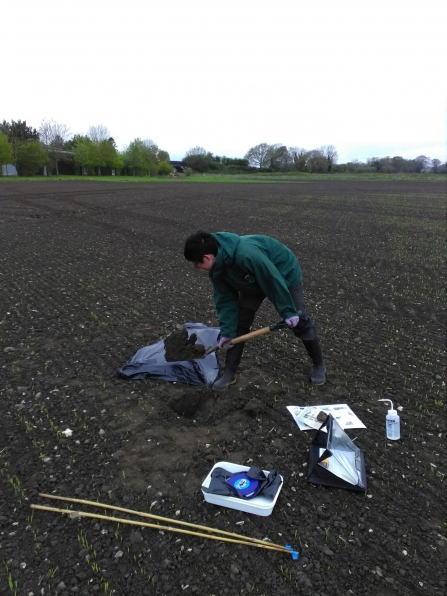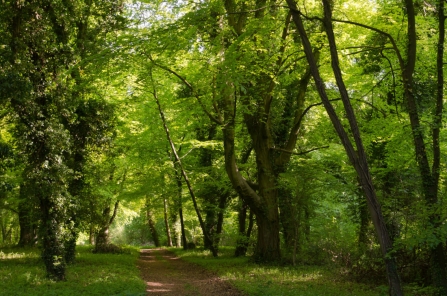
Trainee ecologists © Sarah Boswell
Chappetts Copse by Mark Heighes

Trainee ecologists © Sarah Boswell
Mariko
Hi, I’m Mariko, I'm the 8 month Trainee Ecologist with HIWWT and started at the beginning of April. This is my first full-time paid role in conservation or ecology, and it has already been a great experience! Before coming here I had volunteered with the RSPB and National Trust, done some casual survey work with ecological consultancies, and most recently spent 15 months as Conservation Officer for the Alderney Wildlife Trust.
In my first few weeks with HIWWT I have had the opportunity to assist on a range of surveys, from reptile and dormouse checks, to newt surveys, butterfly transects and moth trapping.
I am leading on an earthworm survey project, which is looking at earthworm abundance and diversity as a measure of soil health in agricultural land. This is completely new to me, so it has been an interesting process to plan and carry out the first surveys. More on this to come!

Sampling earthworms ©Mariko Whyte
I will also be leading on our riverfly surveys this summer, which are carried out monthly at our Winnall Moors Nature Reserve in Winchester. These surveys use the kick-sampling technique to sample the invertebrate community, with a focus on the aquatic larvae of some groups of insects. These groups spend most of their lives in freshwater systems, and are very sensitive to any changes in their environment due to pollution events. The surveys are an excellent way of monitoring the river’s health and ensuring that, if anything does change, the source of the pollution can be quickly tracked and controlled.
Dave
Hi, I’m Dave and I am one of the 6 month trainee ecologists with the HIWWT. I have loved wildlife conservation since school and have been looking to start a role as an ecologist so this job is a fantastic opportunity. Before starting here I worked as a volunteer ranger, intern and then contractor for the North Devon National Trust. Whilst there I got to help lead the surveying and practical habitat management for many key groups including wildflowers, reptiles, birds, dormice and butterflies.
Working here has given me the opportunity to do many of those same surveys under expert guidance as well as surveys that I’ve never done before such as amphibian, crayfish, bat and purple emperor surveys. I’ve already learned loads and can’t wait to see what else is in store as summer approaches.
My favourite experience so far has been surveying for great-crested newts. Though they are still widespread in most of the UK, great crested newts are currently in decline. This is mostly due to loss of suitable habitat, not helped by their somewhat fussy habitat requirements. They favour large ponds absent of fish which has made it difficult for them to adapt to the habitats provided by garden ponds. They also like to have a diverse terrestrial habitat surrounding their pond with plenty of places to shelter. Thankfully they are often still doing well where there is suitable habitat and we found 10 adults at the site we were surveying. I had never seen one before and was amazed by how large they were. They are roughly double the length of the other British newt species and some of the adults can reach up to 170mm long! They are charming creatures and it is great to see sites where they are still doing well.
Becky
Hello! I’m Becky, the new Trainee Geospatial Ecologist, and I’ll be at HIWWT for six months, funded by the Richard Hedley Fund. I love ecology and data, so this is the perfect job for me! Before I started work here I worked on surveys and data analysis at a long-term woodland monitoring project near Oxford, in order to find out about how the woodland was changing as a result of climate change and management abandonment.
While I’m here, I’ll be working on a range of things, from surveys to data management to map-making! I’ve already been able to go surveying for lots of interesting wildlife, including doing surveys that I haven’t done before (most of my previous survey experience has involved trees, so butterflies and dormice are very exciting in comparison!). One of my favourite experiences has been surveying reptiles; I’d never seen a slow worm before, but we found lots. Male slow worms are much greyer than the females, which have darker brown sides and a dark stripe down their back: pleasingly easy to identify for a beginner!

Chappetts Copse by Mark Heighes
I’ve also been out to join in the annual orchid survey at Chappett’s Copse, a HIWWT reserve near West Meon. Chappett’s Copse is a nationally important site for the sword-leaved helleborine, which has been declining across the UK, so every year volunteers count every single sword-leaved helleborine in the woodland, in order to monitor how the population is doing. The count has been happening since 1996, which means that we now have an amazing 20-year dataset to help us understand and protect the orchid population in the copse.